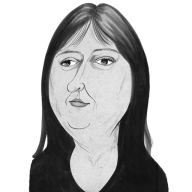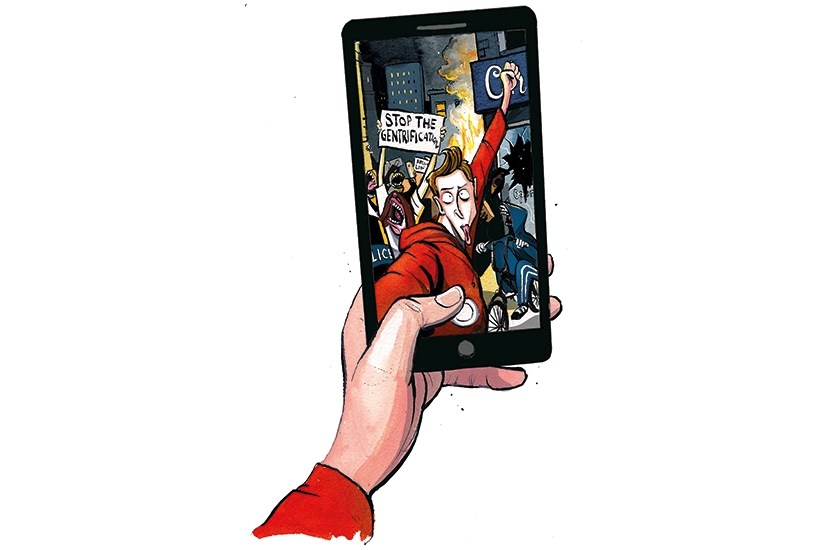Seeing my hometown, Bristol, in flames this week following the violent ‘Kill the Bill’ riots, it was unrecognisable as the safe south-west city which I had dreamed of leaving since the age of 12 (when I started sleeping beneath a poster of Harry Beck’s classic London Underground map). I finally escaped to the capital in search of fame, fortune, sex and drugs at 17.
When some people say ‘I don’t recognise the place’, they’re usually talking about the effects of immigration, but that’s not my experience. Bristol always had a large black population, though thankfully not as a result of the city’s shameful history of slave trading, which at its height saw more than 2,000 ships take around half a million Africans to slavery in the Americas.
My black schoolmates were not simply accepted; they were inevitably at the centre of every year’s in crowd. Sadly, the same was not true of the quiet and studious Ugandan Asians who arrived in the 1970s, and who the black and white cool kids delighted in teaching rude words to. I learned young that black and white is never just a case of black and white, but of cultures. It was a lesson that would stand me in good stead when arguing against the inane insistence that the history of the human race consists solely of white villains and non-white victims.
Peevish posh kids are using working-class neighbourhoods as a stage for their temper tantrums
No, when I say I didn’t recognise the place where I was born — far from saying it’s been taken over by ‘foreigners’ — I mean that I didn’t realise exactly how it had fallen to a certain sort of detestable white person: the Trustafarians, rich kids slumming it, as rich kids always have, but this time in the name of virtue-signalling and violence rather than good honest vice.
How did I miss it? Though I left in 1976, I went back regularly to visit my parents until their deaths at the turn of the century. But they lived in a working-class neighbourhood half an hour from the city centre, so I never really witnessed the tectonic shift taking place, turning Bristol from a serene city to a maelstrom of malevolence.
In 1980 there was a riot born of genuine grievance in the St Pauls area, when the mostly black residents finally lost patience with the heavy-handed police force. Looking on the bright side, in the 1990s the combination of lively Jamaican culture and laidback West Country attitude produced the mighty music genre of trip hop — and Banksy. Bristol University became famous as a party place: Jemima Goldsmith Khan even went there. From 2014, the city started showing up at the top of the Best Places To Live surveys.
As with Sussex University in my adopted hometown of Brighton, the overprivileged and undercooked spawn of the bourgeoisie moved in and never left. They merely stopped washing their hair and started calling themselves Antifa rather than Annabel. This was a new face of gentrification: ventrification, which is all about peevish posh kids using working-class neighbourhoods as a stage for their temper tantrums.
Watching footage of the riots, my first thought was ‘I’ve seen that face before!’ It wasn’t an old school chum I’d spotted, but a type: the Toytown freedom fighter who is passionate about Palestine but can’t point out where it should be on the map. These people are very cross indeed that their dream job in the media probably won’t be waiting for them when they’ve completed their gender studies degree.
A hometown friend from my schooldays said as much after witnessing the unpleasantness: ‘The riots this time weren’t organised by Bristolians — these were outside trouble-makers. But of course it will be the ordinary people of Bristol, of all races, picking up the pieces and paying the price once more.’
Marvin Rees, the black mayor of Bristol, said the riots were ‘absolutely unacceptable’. ‘I don’t know what the proportions are, but I do suspect that a number were serial demo-attenders who are looking for any opportunity to engage in physical confrontation with representations of what they see as the Establishment… I highly suspect there were a number of people from outside the city.’
For people who supposedly hate American influence, this self-righteous rabble seem very keen on turning my hometown into a twin of Portland, Oregon, where all sorts of shady stuff (the defunding of the police, the pushing of trans policies which will impact on female spaces) is being pushed. It’s ironic that I left Bristol to escape the peacefulness which the teenage me was so contemptuous of. Now I see my city in flames and yearn for the good old days.







Comments